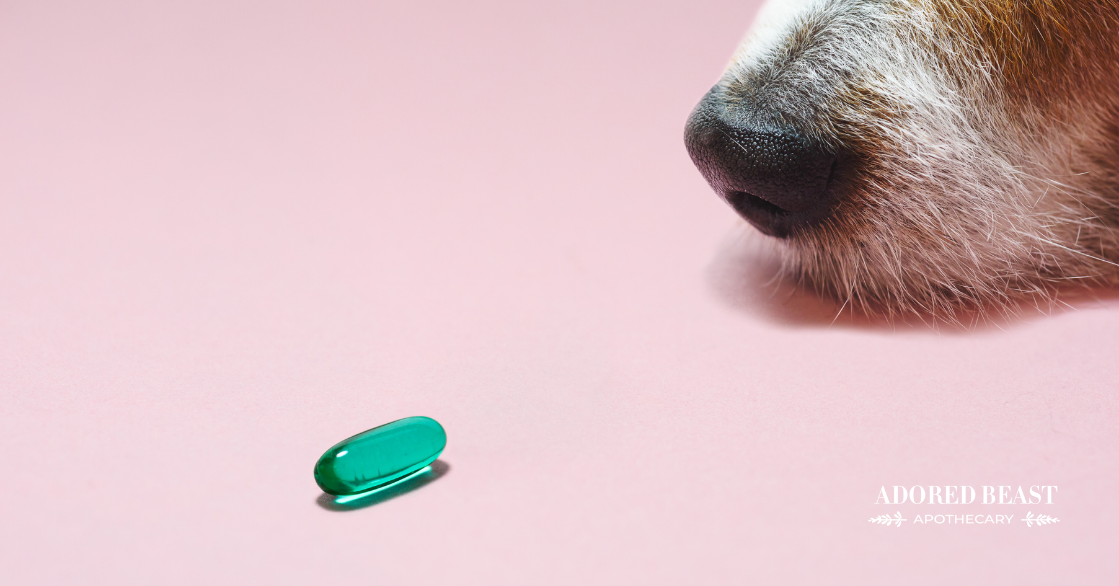Drugs for dogs: enemy or friend? Do we need them, and if so, is there a more holistic way to use them?
I will be the first to say that I was a firm believer that drugs were my nemesis. That was until I started to look at them from a very different perspective.
And today I want to work through the muck that is conventional prescribing, over-prescribing, or the belief that we should stay away from drugs for dogs completely.
This is an important and complex topic. But it’s a discussion that needs to be had.
My Biggest Issue with Conventional Drugs for Dogs
First of all, I think the biggest issue I have with drugs is the way they are prescribed and the lack of conscientious follow up. I would say that over 75% of all the patients we saw in my clinic would be in a category I call drug pathology, rather than organic disease.
Let me explain what I mean by that.
As a result of major workload, many, many veterinarians just do not have the time to go through an entire dog’s file, both before and after the prescribing of a drug.
They see so many patients in a day (and we thank them for making themselves available to us), and that means the time they can devote to each patient is limited.
So, they review current symptoms and prescribe a drug. But that’s done either without reviewing past experience, or without checking on things like:
- was it well tolerated in the past (no diarrhea, vomiting, seizures, organ toxicity issues, etc.)?
- did it alleviate the symptoms, eradicate the bacteria or infection, or stop the pain?
- what happened after the drug (at least 3 months after)? Did the symptoms return? Did the body create a deeper pathology (eg. cleared an ear infection, but then had chronic GI issues leading to inflammatory bowel disease)?
Just close your eyes and imagine it: 30-150 pages of records to go through to try and get a sense of what is going on. In most cases, this is a body with layers upon layers of drug pathology.
Let’s go through an example…
An Example of Drug Pathology
A puppy gets her first, second, or third booster vaccine around 6-14 weeks of age.
Then she gets puppy vaginitis or a badder infection or an ear infection, etc… which we have seen as a reaction to the vaccines. She’s prescribed an antibiotic (almost always without doing a culture) to clear up any infection. The symptom at hand clears up.
But! 6 months later, the puppy starts having a reoccurring ear infection, or is sensitive to her food, or starts to lick and chew her paws.
Instead of looking back at the puppy’s records and considering that the gut flora may be traumatized by the original antibiotics, the puppy is given a change of diet (usually a vet-prescribed allergy formula or a GI formula). This leads to even further destruction for the gut microbiome.
Because this change of food doesn’t address the real issue, symptoms return – either of the first disease state, or a completely new one. Now, again not looking back, the vet prescribes additional drugs to treat the new symptoms: antihistamines, steroids, more antibiotics, immune suppressive drugs, non-steroidal anti-inflammatories (NSAIDs), anti-microbial (drugs for yeast)…
This vicious cycle creates deeper, more destructive issues that need more drugs, and there you have it: chronic disease/drug pathology, that often largely could have been avoided.
It’s Not Your Vet’s Fault!!
Now, let me reiterate – this is a larger symptom of a veterinary industry that has too few practitioners to handle the number of animals requiring care. There are only so many hours in a day, and most veterinarians just can’t take the time to spend hours on end with one patient. (This is not just a veterinary problem – we face it as well in human medicine) This is not their fault. Their end goal is to help your animal – but they’re limited by time constraints.
That said, reviewing prior drug facts in a patient’s chart is critical to avoid this drug pathology. And putting in proper mechanisms to avoid the negative outcomes is also critical. We know now that many veterinarians will recommend probiotics after antibiotics – that’s a step in the right direction – and one that makes a huge difference.
So, coming back to the topic of this article – it’s not always the drugs that are the problem, but rather the way they are used.
When Drugs for Dogs are Necessary
As I mentioned above, I no longer look at drugs for dogs as the enemy. Drugs 100% have their place in veterinary care. No drug was ever given at our clinic without looking at the side effects of that drug and previous interactions for the patient, and then holistic support was always added to mitigate these effects.
There are times when they are absolutely necessary. I typically put them into 3 categories:
- Life threatening acute situations – for example, when a dog is hit by a car, has ingested poison, or is having seizures that are not stopping. Anything that your dog can die from in an immediate timeframe requires drugs! In our clinic we still always did supportive homeopathy to help stabilize shock, reduce trauma, decrease inflammation, and reduce long term detrimental effects.
- Surgical support – this one is pretty self-explanatory, but again, we always used them with supportive homeopathy and probiotics to aid in wound healing, detox from anesthetic, etc.
- Pain relief – if your dog is in severe pain, she needs help. I discuss this in more detail below.
At the clinic we rarely used drugs but when it was necessary, we would ask ourselves, does the drug match current and past pathology and physiology? For example, if there has been liver issues, has the drug of choice been carefully chosen to be safe for the liver? Or, if there is a bladder infection and an ear infection at the same time, has a culture and sensitivity been performed on both the ear swab and the urine so that the antibiotic chosen can correctly address both issues, rather than just one?
This approach of holistic, historic, and chronological pathology holds true with the majority of all drugs.
Conventional Drugs for Dogs in Pain
Pain! There are so many different kinds of pain. Joint, musculo-skeletal, chronic skin issues, cancer, pancreatitis…
We had two very strict rules on pain:
- There shouldn’t be any.
- If there is, it should be visibly and emotionally very tolerable, meaning your dog has an amazing quality of life.
Enter pain meds.
Our number one go-to was homeopathy, hands down! That could mean as the primary support or as part of an integrative approach so we could keep the conventional medication to a minimum to avoid side effects.
If we needed drugs acutely, we would do the recommended dose to start, but 99% of the time with homeopathy we would be able to reduce the dose very quickly, therefore having wonderful pain relief without concern of side effects. We also used supportive herbs, for example, milk thistle, if the drug of choice was processed by the liver.
We also used something, particularly with steroids and skin disease, that was incredibly helpful. This is where the use of steroids can be so effective long term. YES I SAID THAT! It’s called micro-dosing!
Micro-dosing Drugs (My Favourite!!!)
I cannot even begin to estimate the number of animals we put back on corticosteroids (usually prednisone) yet in a very unique way because they were on this viscous cycle of drugs -> relief -> drugs stop -> dog gets way worse. It’s called suppression – relief – rebound with a vengeance!
At this point, the pet parent would often be too afraid to do more drugs which is TOTALLY UNDERSTANDABLE AND COMPLETELY TRUE!
So why restart at all?
Well, if your animal stays in a state of chronic pain or chronic itching, sooooo many things then contribute to the disease getting worse. The dog’s stress hormones go crazy, depression kicks in, scratching causes more trauma, and bacteria settles in. Then more antibiotics are added to the mix, worsening gut health and increasing yeast. Then, throw in lack of movement from feeling unwell, lack of sleep, and lack of affection from a pet parent afraid to touch a dog with skin disease, and you have a dog who is really, really struggling.
But, if you can stop this cycle and at the same time address the underlying issue with homeopathy, diet, herbs, and emotional support, the body has a way of balancing itself all while your vet is reducing the drug to the smallest amount possible! This is done slowly and with a ton of input from you, the pet parent, on any changes so your vet can increase or decrease the drug in the smallest incremental amounts depending on how you dog is reacting.
BUT YOU CANNOT DO THIS OWN YOUR OWN!!!!! Micro-dosing is amazing, but it needs to be done by your vet.
You can be very clear with your vet that you want to try this approach and you will need to be solid in your conviction to try. We were constantly told there was zero therapeutic benefits to the small amount, yet we had so many dogs do so well with it. We saw success with everything from terrible skin disease to severe arthritis to cancer.
If you can’t find a vet to help you, you still have to manage your dog’s pain so please reach out to holistic or integrative vets in your area. In the meantime, find out the side effects of the drug and do homeopathic medicine to support her body until you get that help.
Drugs for Dogs: Final Thoughts
In summary, these are what I see as the main issues:
1. The merry-go-round of drugs: on – better, then off – worse, then on – then, off… This deepens the disease, causes side effects, destroys the gut, and can cause antibiotic resistant disease (if antibiotics are used). The suppression – relief – rebound with a vengeance syndrome never ends.
2. On a certain drug too long BUT then not weaned off for a long enough period of time or decreased via micro-dosing (mostly corticosteroids).
3. The incorrect drug chosen (for example, the wrong antibiotic or NSAIDs given to an animal with high liver or kidney values).
4. Too many different drugs given at the same time, causing severe drug pathology.
5. Nothing being done to support and heal the underlying issue while on the drugs!
6. Letting dogs suffer just to avoid using drugs instead of supporting the body to heal and addressing the side effects of the drugs.
7. The lack of veterinary exam time to be able to use drugs in a way that recognizes and appreciates the animal’s past use and experience.
Drugs for dogs can be a very complex topic, especially in holistic circles. In my opinion, there is a delicate balance between drugs being life-saving or life-taking.
In various situations, they have their place for sure, and we’ve used them for many patients in the past. I am personally very respectful of them in the right hands and for the right reasons. We just need to remember that they cannot be used to treat an issue in isolation. They need to be used in a holistic approach – treating the whole animal, not just the symptom. By looking at the main goal and indication of any particular drug, as well as side effects and a dog’s past history, we may be able to get back to a place where they can be used only in rare situations when they’re really needed.












